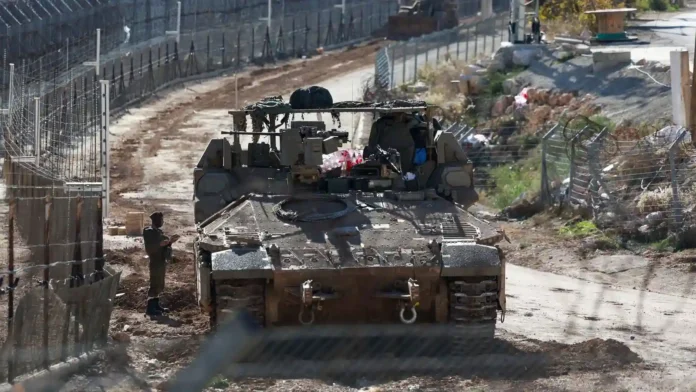Israeli troops have taken control of a demilitarised buffer zone in the Golan Heights, a move that has sparked international condemnation, particularly from Egypt and Qatar.
The 155-square-mile area, established by a 1974 ceasefire agreement between Israel and Syria, has remained a neutral zone for decades, patrolled by United Nations peacekeepers since the end of the Yom Kippur War.
The seizure follows the collapse of Syrian President Bashar al-Assad’s regime, which was overthrown by a rebel advance on Sunday.
Israeli Prime Minister Benjamin Netanyahu justified the action, stating that the Syrian government’s retreat from the zone left a power vacuum, prompting the need for Israeli forces to take a “temporary defensive position.”
Netanyahu also declared that the 50-year-old ceasefire agreement had effectively “collapsed,” leaving Israel with no choice but to occupy the area for security reasons.
“This is a temporary defensive measure,” Netanyahu said while speaking from Mount Bental, a strategic observation point near the Syrian border.
He linked the fall of the Assad regime to Israel’s earlier military operations against Iran and Hezbollah, both of which have been key supporters of Assad’s rule. “The blows we inflicted on Iran and Hezbollah directly contributed to this outcome,” Netanyahu remarked.
However, the move has been met with swift condemnation from regional powers. Egypt’s foreign ministry accused Israel of exploiting the situation in Syria to expand its territorial control, claiming the move violates international law and creates a “fait accompli” on the ground.
Cairo has called for the United Nations Security Council to take a “firm position” against Israel’s actions, emphasizing that the buffer zone’s status should be upheld.
Qatar also expressed concerns, labeling the Israeli action as a “dangerous development” that risks escalating regional tensions.
Both countries, along with much of the international community, view the Golan Heights as occupied Syrian territory, a stance that is widely accepted except by Israel and the United States.
The Golan Heights has been a point of contention since it was captured by Israel during the 1967 Six-Day War.
Israel later annexed the strategic plateau, a move that was condemned by most of the international community, which considers it Syrian land. Despite this, Israel maintains control over the region, citing security concerns due to its proximity to Syria.
Israel’s Defense Minister, Israel Katz, echoed Netanyahu’s sentiments, calling the fall of Assad’s regime a “severe blow” to the so-called “Iranian axis of evil.”
He added that the actions taken by Israel were part of a broader strategy to weaken Iran’s influence in the region, likening the country’s influence to the “arms of an octopus being severed one by one.”
As Israel moves into the buffer zone, the military has warned residents of five southern Syrian communities to remain in their homes for safety, signaling heightened tensions in the region.
Iran, a staunch supporter of Assad, has expressed concern over Israel’s actions, with Foreign Minister Abbas Araghchi accusing Israel of exploiting the situation to its advantage.
The situation remains fluid, with the international community closely monitoring developments. The United Nations and various stakeholders are expected to weigh in on the potential implications of Israel’s actions for regional stability and international law.

